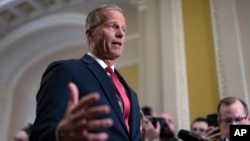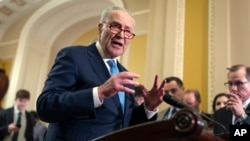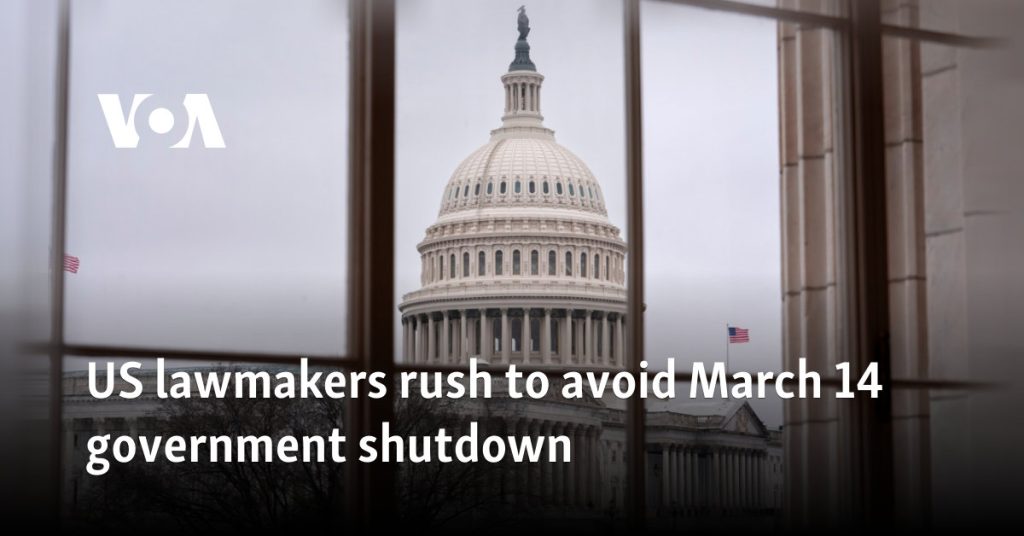U.S. lawmakers are one step closer to funding the government past a March 14 deadline, but Congress still has serious issues to resolve as they come back to work in the nation’s capital this week.
At question is how and when to enact a proposed extension of the 2017 tax cuts and how to pay down the U.S. deficit without cutting key safety net programs that help American voters.
President Donald Trump has called for lawmakers to pass “one big, beautiful bill” that will be a key part of enacting his domestic policy agenda.
Despite Trump expressing his preference for the House of Representatives version of the budget, the Senate passed a funding resolution Friday that provides $150 billion in military funding and $175 billion for border security. That measure also avoids the controversial Medicaid cuts in the House version.
Senate leadership has proposed passing the tax cuts in a separate bill later this year.

“Republicans are moving forward on legislation to fund continued efforts to deport criminal aliens, as well as provide other necessary resources to secure our border, discourage illegal immigration and restore respect for the rule of law,” Senate Majority Leader John Thune said Monday on the Senate floor.
But Senate Minority Leader Chuck Schumer characterized the vote as a first step toward extending the tax cuts.
“What are Republicans doing? They’re spending precious time trying to cater to the wishes of the absolutely richest people in America, instead of working to avoid a disastrous halt of services that help tens of millions of middle-class American families,” Schumer said Monday.
The Senate moved forward with a vote on its version of the budget due to uncertainty over the potential success of the vote on the House version. The two versions will have to be compromised to be signed into law.

The House is set to hold a procedural vote on Tuesday, but Speaker of the House Mike Johnson holds a slim Republican majority and cannot afford to lose any members of his own to pass his version of the budget.
Republican Representative Tony Gonzales led a group of seven other House Republicans warning against potential cuts to health care program Medicaid, food assistance funding and other social safety net programs.
“Slashing Medicaid would have serious consequences, particularly in rural and predominantly Hispanic communities where hospitals and nursing homes are already struggling to keep their doors open,” the lawmakers said in a letter to Johnson sent last week.
Republican Representative Thomas Massie, a member of the conservative Freedom Caucus, also expressed concern about the version of the budget up for a vote, along with several other undecided House Republicans who have not yet announced their votes on the measure.
Congressional Democrats also object to the Republican tax cut proposal, arguing it will harm lower-income and middle-class Americans who are already concerned about the cost of living and inflation.
In a “Dear Colleagues” letter sent Monday morning, Democratic Leader Hakeem Jeffries wrote, “Far-right extremists are determined to push through $4.5 trillion of tax breaks for wealthy Republican donors and well-connected corporations, explode the debt and saddle everyday Americans with the bill by ending Medicaid as we know it. We must be at full strength to enhance our opportunity to stop the GOP Tax Scam in its tracks.”
Trump posted on Truth Social last week that “The House and Senate are doing a SPECTACULAR job of working together as one unified, and unbeatable, TEAM, however, unlike the Lindsey Graham version of the very important Legislation currently being discussed, the House Resolution implements my FULL America First Agenda, EVERYTHING, not just parts of it!”
If lawmakers cannot reach a compromise by March 14, there will be a partial government shutdown, leaving millions of federal employees temporarily without pay and suspending some non-essential government services.








